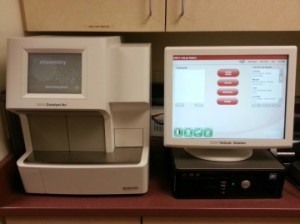
My pets appear healthy…why do they need bloodwork?
Reasons why we recommend routine blood work:
Most importantly, we recommend blood work during an exam to detect illness in the early stages.
Blood tests frequently detect illness in your pet before we can see any outward signs of disease. Animals are experts at adapting to pain and illness and often don’t show physical symptoms until a disease is in an advanced stage. Early detection means earlier prevention and treatment. Treatment is often less invasive and less costly when a disease is in its infancy, but more importantly, early medical intervention can save your pet’s life and greatly increase the chance of a complete recovery. Don’t wait until your pet becomes afflicted with a condition, stay on top of your pet’s health by catching diseases and conditions before their symptoms start causing trouble.
Real life example: Here in Southern Arizona, a great example of this concept is detecting Valley Fever. We have had multiple patients that were diagnosed with Valley Fever based on routine blood work or pre-anesthetic blood work before a routine anesthetic procedure such as a neuter or dental cleaning. A healthy, adult German Shepherd patient was dropped off for his neuter. Chemistries and a CBC were performed and the results exhibited elevated Monocytes (a white blood cell) and elevated Globulins (a protein). These are classic signs of Valley Fever that we see in blood work. Upon detection we were able to confirm the diagnosis with a Valley Fever titer and start treating immediately. If blood work was declined or put off on this patient he would have started showing symptoms and his Valley Fever would not have been treated until his condition had worsened.
Blood tests won’t hurt your pet, but not having them done could – Kim Downes, DVM
Running blood work on healthy pets gives us your pet’s normal baseline values to compare to later.
All animals are different and obtaining a baseline result to compare future tests to improves the test’s overall efficiency. Often routine blood work is recommended before starting a new medication, such as an NSAID that is metabolized through important internal organs. By establishing a baseline we can determine if the new medication has caused an elevated liver or kidney enzyme months after it was introduced to your pet.
What are the tests that we will run?
We’ll routinely perform a complete blood count (CBC) and a complete blood chemistry panel, including electrolytes and urinalysis. The CBC tells us if there is infection, inflammation or anemia. The chemistry panel and electrolytes tell us if your pet’s liver, kidneys and pancreas are healthy and performing as they should. A urinalysis tells us if there’s infection or inflammation in the urinary tract—a common problem for pets of all ages. A T4 test provides information about your pet’s thyroid gland function. This is extremely important because thyroid disease is common in dogs and older cats.
Here at Adobe, we are able to perform our in house chemistries, electrolyte panels and complete blood counts in less than 15 minutes.
Your pet can’t tell you why he or she is not eating or where it hurts. Oftentimes blood work will tell the doctor the problem to address quickly, so don’t forget the importance of routine blood work and diagnostic testing. It can be the difference between adding years to your pet’s life and saying goodbye to your beloved friend too early.
Sources: http://www.healthypet.com









